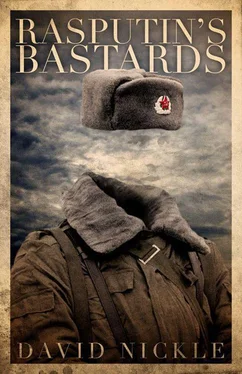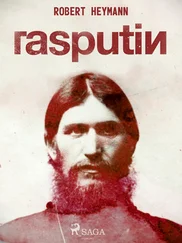Alexei looked over and down at Mrs. Kontos-Wu. “Was he?”
“He destroyed it.” Mrs. Kontos-Wu shivered, as she recalled the flames crawling up the tapestries and the glass exploding in glowing red shards.
“Well he did a very poor job, now did he not?” Alexei knocked on the oak table-top, turned one of the green-shaded banker’s reading lamps on and off again. “This appears very solid.”
Mrs. Kontos-Wu shook her head. “It — comes back. Someone keeps rebuilding it.”
“Someone?” Alexei frowned.
Mrs. Kontos-Wu looked at her hands. She balled them into fists and opened them up again.
“Babushka,” she said.
Alexei shook his head.
“You have been ill-used,” he said. “Babushka, Kolyokov… these Mystics here. All the same. They use us like puppets for sickening games. But tell me — do you truly think it is Babushka who keeps remaking this comfortable place for you?”
Mrs. Kontos-Wu looked at Alexei. Squinted. “What are you doing here anyway?” she said. “You’re not supposed to be able to do anything like this. You’re a sleeper — lower level even than I.”
“Such a humble creature.” Alexei smiled. “Is that so, do you think? Then how can I be here?”
Mrs. Kontos-Wu frowned.
“You failed to answer my question,” said Alexei. “Do you truly think it is Babushka who keeps remaking this place?”
“I—”
“Yes?”
Mrs. Kontos-Wu balled her fists. Opened them again. Looked up at Alexei. “No,” she said.
“Ah,” said Alexei. “Then who?”
Me .
Mrs. Kontos-Wu couldn’t say it — but she knew it. Lena — Lois — Babushka may have come here, may have made use of this place. But ultimately, it was Mrs. Kontos-Wu — Jean Kontos-Wu — who came here for comfort and in terror, and put it back together when other, wiser people tore it down. This place was a prison — but not one administered by City 512 any longer. It was one of her own making.
Alexei leaned down in front of her. He spoke softly.
“Mrs. Kontos-Wu,” he said. “I have been on a very long journey since we parted. I have gone to see my history and my past and seen the things I have done and might have done. And I will tell you something.”
“Yes?”
“There is nothing that is a greater comfort than living in a convincing lie about oneself.”
Mrs. Kontos-Wu stood and stalked over to the U-V aisle.
“Particularly,” said Alexei, “when the truth entails so much wickedness.”
Mrs. Kontos-Wu turned. Her gut was churning — she felt as though she might puke. The world — the library here — was shifting and bending slightly, fading at the edges. But those shifts were nothing compared to the change that was coming forward in Alexei. He seemed to be growing taller — his skin darker — and from his middle —
“Let me see if I can do this right.”
She gasped. “K-Kilodovich,” she said, “zip up your fly.”
But that wasn’t what it was. The long black thing was emerging from his stomach — where his navel should be — snaking out from behind his shirt, lashing across the room towards her.
“It is painful,” said Alexei. “But it will be quick. It should be quick.”
As the whip lashed her face, Mrs. Kontos-Wu fell backward—
—backward into the lie that was her life.
THERE ARE NO GUILTY PEOPLE
Tom Wu was fifty-three. Jean was twenty-two. Standing amid the lilies on the roof of his penthouse, thirty-seven storeys above Hong Kong harbour, Tom Wu stared at her, tears running down cheeks beneath eyes weakened with injury, waiting for an explanation. Jean Kontos-Wu shrugged: what could she say? He had the goods — photographs of her and Amar Shadak, “the filthy Turk” — both naked, her legs wrapped around his torso, smiling into his eyes as he rammed himself into her. He had the bank records, which showed the withdrawals she’d made over the past month and a half — the massive transfers of cash from Hong Kong to New York to Switzerland. He didn’t have the shipping manifests yet, that showed the unidentified materials that were moving from Kowloon through the China Sea and the Indian Ocean, up through the Suez and into Turkey. He also didn’t have time.
So Mrs. Kontos-Wu shrugged.
“You have betrayed us,” said Tom Wu and that was all. The chemical she’d insinuated into his drink took effect, and his eyes went wide and his heart stopped and he died.
John Tournier was the head of a consortium in New York that owned the Emissary Hotel. He was sixty-eight. Mrs. Kontos-Wu was twenty-five. He didn’t look at Mrs. Kontos-Wu with anything like surprise when his time came and title to the hotel went.
Ian Forrester was forty-one. Mrs. Kontos-Wu was twenty-six. His eyes met hers through four inches of churning water in a hot tub as his lungs filled up with water and the files on his computer shuffled from hard drive to diskette.
Lisa Churley was twenty-nine. Mrs. Kontos-Wu was twenty-seven. It took two jugs of acid to get rid of her remains. In addition to her notebook and tape recorder, her purse held a picture of a heavy-set balding man and a little boy grinning like idiots in front of what looked like the Grand Canyon. Mrs. Kontos-Wu threw it into the bath with everything else. The man stepping off the turboprop could have been anywhere from twenty-five to forty. Mrs. Kontos-Wu was twenty-eight. Brain and bone spread across the adobe mural in the little airport and Mrs. Kontos-Wu unscrewed the barrel of the rifle, pulled off the stock and folded it into her carry-on bag.
Elmer Bergensen was in his thirties. Jerri Bergensen was a little younger but not much. Mrs. Kontos-Wu was thirty-four. They had rescued her from the ocean and asked a few too many questions. And they were dead.
Mrs. Kontos-Wu blinked. She was sitting in the mess of the submarine. Ilyich Chenko and Tanya Pitovovich were there too. Chenko touched her hand compassionately. Mrs. Kontos-Wu shook her head. Twitched. Her eyes were damp with tears. Her face was hot. She inhaled a mouthful of salty snot. She’d been bawling.
“How long have I been here?” she asked.
“Not long,” said Tanya.
“Perhaps a quarter hour,” said Chenko.
Uzimeri stepped into her field of view. “Has the Babushka finally blessed you?” he asked.
Mrs. Kontos-Wu laughed weakly. “No,” she said. “No more Babushka.”
“Well however you’ve come to it,” said Tanya, “you are back to yourself.”
“It’s not about me,” said Mrs. Kontos-Wu.
“Hmm,” said Chenko. “Sounds as though you’re reaching an epiphany .”
“Be quiet a moment. She’s working it through.”
Mrs. Kontos-Wu frowned. It wasn’t about her. At least not her victimization. It was true that Fyodor Kolyokov had lied to her and imprisoned her. But the truth was that it was her hands that drove a beer bottle down the throat of a kind and innocent woman — whose only sin was helping a stranger lost at sea. Kolyokov’s programming might let her rationalize away responsibility. But it was an escape hatch.
“Where is Stephen?” she said finally.
“He is back,” said Uzimeri.
“Where?”
“Where the Children sleep,” said Chenko. “They found him in the station. Now they are finding out how it is he betrayed them.”
“How he betrayed them.” Mrs. Kontos-Wu stood up. “Excuse me,” she said.
“Where are you going?”
Mrs. Kontos-Wu didn’t answer. She gingerly stepped around the passengers, ducked her head, and half-ran down the narrow spinal corridor to aft.
She met a guard along the way. He smiled at her.
“Mrs. Kontos-Wu,” he said.
“Alexei?” Mrs. Kontos-Wu couldn’t say how she knew. Maybe something in the eye. “Are you dream-walking here now too?”
Читать дальше












